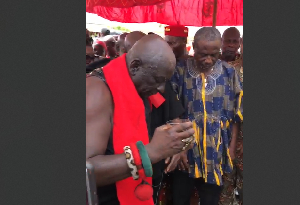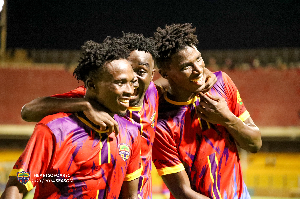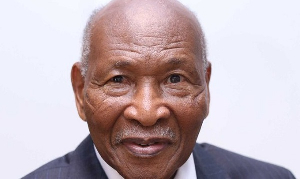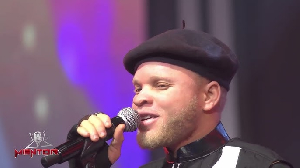Opinions of Monday, 19 March 2007
Columnist: Fordwor, Kwame Donkoh
Between Faith & History: A Biography of J A Kufuor
“Between Faith & History: A Biography of J A Kufuor-Ivor Agyeman-Duah”
I have carefully read your biography of J. A. Kufuor, entitled “Between Faith and History”. This was launched a few weeks ago in Accra. In addition to some notable factual inaccuracies in various parts of the book, I have noted with concern the number of statements and passages which directly or by implication cast aspersions on the role that I played in the NPP during the early part of the 1990s. I am particularly surprised by the amount of incorrect information and twisted judgments that you make about me in the book because I know that you were in Kumasi at the time of these events and actually wrote several articles about some of them in both the Ashanti Pioneer and the Ashanti Independent newspapers. I am sure I do not need to remind you that, as a historian, your first obligation is to narrate facts with accuracy and objectivity and your second duty is to ensure that the judgments that you make are based on the facts as they were and not as you or others would like them to be. As Herodotus, the father of History, stated in another context, not to know what happened before you were born is to forever remain a child. In other words, we need to learn about our past as well as the present so that we can reflect and speak meaningfully about the future. For if we wish to predict the future with any degree of confidence, we need to take account of the past as well as the present.On the very first page of chapter 6 of your book, you write: “Having agreed that the 1992 national election was rigged and hence The Stolen Verdict, supporters and spin-doctors of Prof. Adu Boahen argued that it was not necessary for the party to have another congress, but rather, maintain the Professor, since the defeat of the party was not for lack of the professor’s marketability”.
I was among the strongest and most consistent supporters of Prof Adu Boahen. Our support for the professor was public and all our activities and arguments were always open and above board. I, therefore, take strong exception to your statement and the deliberately negative implications behind it. In the first place, your description of the Professor’s supporters as “spin doctors” is clearly intended to depict us in bad light, by creating the impression that we were using dishonest or unscrupulous means to promote his cause. There is no basis for this insinuation and you give no evidence to support it. Secondly, your statement appears to suggest that it was only the supporters or “spin doctors” of the Professor who agreed that the 1992 presidential election was rigged. You,
of all people, should know that this was the general view, not only of the NPP but also of the other opposition parties. This judgment was equally shared by many, within and outside the NPP, some of whom were detractors of Adu Boahen. Nor is it correct, as you appear to imply, that the publication The Stolen Verdict was produced by the supporters and spin-doctors of the professor. The undisputed fact of history is that both the National Executive Committee and the National Council of the NPP, which met at various times to review the conduct and results of the presidential election, were unanimous in their conclusion that the elections were flawed, based on the interim reports received from all the regions. Consequently, following the very difficult decision by the NPP to boycott the parliamentary elections, it was also decided that documentary evidence of the serious irregularities in the presidential election should be produced; and a team was appointed, under the leadership of Nana Akuffo Addo, to produce the document which became The Stolen Verdict.
It is true that immediately after the 1992 elections some people in the NPP (including some who were not necessarily supporters of Adu Boahen) suggested that, since the Party was convinced that it had won the 1992 presidential election but had been robbed of the victory, it would not be logical to change the flag-bearer who had actually won the election. It became clear, however, that this view was not held by the majority of the Party, and it was eventually agreed by everybody that we should respect the provision of the Party constitution which required that “the election of the party’s Presidential candidate shall take place at the national congress held not later than twenty-four months from the date of the national election.” As you yourself state (at page 73) Professor Adu Boahen publicly accepted this position and admitted that his earlier view that no election was necessary was not correct. This shows how honest a person Adu Boahen was: he never believed that he was infallible and he was ready to admit when he went wrong, even on such an important matter that would affect his political destiny. In the event, he did not win the election at the Congress. As you know, this Congress was held only 8 months before the 1996 election, in flagrant breach of the requirements of the Party Constitution which provides that the election should be held not later than 24 months before the presidential election. I am sure I do not need to remind you of the reason why the Congress was delayed in this way, and also how this delay affected the fortunes of Professor Adu Boahen.
You also make or glibly repeat very damaging and wholly unfounded allegations against me in connection with the formation of the Patriotic Club. On pages 73 to 74 you make the following statements: “The Patriotic Club, a supposedly foot-soldier organization, emerged to galvanize party organization at the grassroots. An attempt to inaugurate the Club at the Cultural Centre in Kumasi failed. The Regional Secretariat of the Party denounced the Club publicly, and accused it of being anti-NPP”.
“Conceived days after the Asante Regional election, which elected Dr. Donkor Fordwor as Chairman amidst controversy of vote buying, it had as its motto “commitment without inducement” and had as members, some of the losers of the regional executive party election in Kumasi-mainly Kufuor supporters”.
Here again, it appears that the intention is to besmirch my reputation. By stating that I was elected Asante Regional Chairman “amidst controversy of vote buying”, you seem to want to give respectability to the accusation. Although you ingenuously give the impression that you are not asserting it yourself, you say nothing about those who made the accusations or the reasons that they gave for them. But you surely must have known that this would lead many of your readers to believe that there was some substance in the accusations. This is not history writing: it looks rather like political mischief-making. This is neither the place nor the time for me to refute the malicious accusation of vote buying. All I can say is that none of the people who made the allegations provided one shred of evidence to support their charges. Any one who bothers to examine the facts of the election campaign and the eventual results with any degree of objectivity will see clearly that these accusations were nothing more than the cries of sour grapes from those who lost the elections and their apologists.
But the most serious charge that you make (or imply) against me is the allegation that I and the members of the Asante Regional Secretariat chose the time of the funeral of Nana Ama Dapaa (Ama Apaa), the mother of President Kufuor, to make the announcement attacking him and the Patriotic Club. On page 74 of your book, you write: “Interestingly, it was at this funeral that a public announcement, denying (sic) the Club, was made by the Asante Regional Secretariat that had as Chairman Dr. Kwame Donkor Fordwor and Secretary A. K. Korankye”. On the following page, you yourself confirm that the Patriotic Club was a “careful Kufuor group”. Thus, the clear implication of the above statement is that I and my colleagues had deliberately decided to attack Kufuor politically at the very time when the funeral of his mother was taking place. As an Akan and a human being, such an act would have been very insensitive and inhuman on my part. Hence, by suggesting that I had acted in this way, you were doing nothing less than trying to present me in the most negative light. And yet you must have known that the chronicle of events as given by you was completely incorrect. The facts are that, prior to October 1994 there had been repeated reports about the formation of the Patriotic Club. In fact an announcement had been made that it would be out-doored on August 21, 1994 at the Cultural Centre, Kumasi. At that time the Regional Executive considered it its duty to take steps to dissociate itself from the Club and its planned inauguration, and it caused an announcement to be broadcast to that effect on Kumasi FM radio. The Regional Executive took further steps to bring the activities of the Club to the notice of all the members of the Party in Ashanti. It sent letters to all the 33 constituencies to advise them of the activities of the Club and requested them not to give the least encouragement to the Club. The reason the Regional Executive acted this way was that the Club had been formed contrary to the constitution of the Party. We learned that attendance at the Club’s meeting was by invitation only. This was in violation of the provision of the constitution which stipulates that “any member of the Party is entitled to attend activities of the Party except as it relates to meetings of elected officers”.
In spite of these measures the Club advertised in the Free Press of 29th September, 1994 its emblem and motto and announced that it would hold a meeting on October 2, 1994 at an undisclosed location and that the meeting was strictly by invitation. Prior to October 2, handouts for the formation of the Club were actually distributed to sympathizers during
the funeral celebration of the mother of President Kufuor. It was in response to these developments that the Regional Executive felt it necessary to issue a statement to inform members of the NPP and the public that the Club was unknown as a supporting group within the Party as it purported to be, and that it was not recognized by the National and Regional Offices of the Party. This statement was issued on the 6th of October 1994 and read on behalf of the Regional Executive by Mr. A K Mmieh, NPP Ashanti Regional Vice Chairman.
It is thus clear that the announcement by the Regional Executive was made well after the funeral of Maame Ama Dapaa; and I can categorically deny that no such announcement was made at the time of the funeral. Rather, it was the supporters of the Patriotic Club who appear to have sought to take advantage of the occasion to give publicity to their project by distributing handouts to the large crowds present. There was no reason or need for the Regional Secretariat to seek to disrupt a solemn occasion such as the funeral of no less a person than Maame Ama Dapaa, who herself was a thoroughbred of the Danquah-Busia Fraternity. By suggesting that this was done, and by linking my name directly with what would have been a very ungracious and insensitive act, you have done grave injustice both to me and to my colleagues of the Regional Executive at the time.
I want to stress that I do not necessarily object to any criticism or unfavourable judgment that you may have made against me. As a historian and as a citizen of the country, you are certainly entitled to your views about me, and indeed about any other public figure. However, whatever you say must be based on the facts as they were or are. It is neither fair nor acceptable for you to misstate the facts or to give publicity to unproven and un-provable allegations which can damage the reputation and standing of innocent people. And, although it is not my purpose to ask you to retract the incorrect statements that you have made about me, I hope that you will find it appropriate to take steps to correct some of the inaccuracies, if and when you have the opportunity to do so.
And if the opportunity presents itself, you might find it useful to correct some of the many errors of fact in the book, including the wrong names that you have given to several of the persons who feature in it. And while you are at it, you might wish to correct one of the most glaring of the historical inaccuracies. This is the statement, on page 38, that Akwasi Afrifa became “military Head of State “after the death of Joseph Ankrah”. As even non-historians will recall, Akwasi Afrifa became Chairman of the NLC following the resignation of General Ankrah, and General Ankrah actually died many years after Afrifa was brutally murdered in 1979.
I sincerely hope that you will accept this letter in the spirit in which it is written. Its purpose is to help to make the history that you wrote more accurate and hence more useful to those who may need to rely on it in the future.
Yours sincerely
Kwame Donkoh Fordwor













